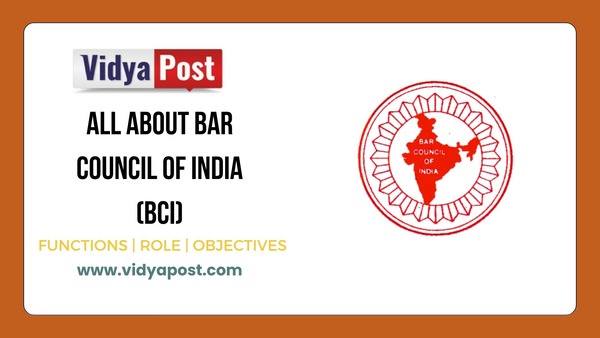All About BCI - Bar Council Of India

The Bar Council of India is a statutory body formed under Section 4 of the Advocates Act of 1961 to oversee legal practice and education in India. Its members are chosen from among India's lawyers and thereby represent the Indian bar.
The Bar Council of India sets the code of behavior for state bar councils, advocates, and legal education standards in India.
It establishes professional conduct norms, and etiquettes, and has disciplinary authority over the bar. It also establishes requirements for legal education and recognized universities whose law degrees would qualify students to practice as advocates upon graduation.
Also, Read Best courses you can pursue after 12th
History
Following the implementation of the Indian Constitution on January 26, 1950, the Inter-University Board at its annual meeting in Madras passed a resolution emphasizing the need for an all-India bar and emphasizing the importance of having uniformly high standards for law examinations in different universities across the country in light of the establishment of a Supreme Court of India.
The Madras Provincial Lawyers Conference presided over by Shri S. Varadachariar, made the decision in May 1950 that the Government of India should organize a committee to develop a plan for an all-India bar and revise the Indian Bar Councils Act to make it compliant with the new Constitution.
That resolution was approved by the Madras Bar Council during its meeting on October 1, 1950.
On April 12, 1951, a member of parliament named Shri Syed Mohammed Ahmad Kazmi proposed a comprehensive bill to alter the India Bar Councils Act.
The Indian government believed that a comprehensive bill sponsored by the government was required given the new conditions following independence.
The "All India Bar Committee," led by S. R. Das published a report in March 1953 that suggested the establishment of bar councils for each state as well as an all-India bar council as the supreme authority. The idea was put forth that the all-India bar council would oversee the regulation of the legal industry and establish the benchmark for legal education.
The Advocates Act was enacted in 1961 to implement the suggestions of the 'All India Bar Committee' and 'Law Commission'. M. C. Setalvad was the inaugural chairman, and C. K. Daphtary was the vice chairman. C. K. Daphtary was appointed chairman in 1963, while S. K. Ghose was appointed vice chairman.
Role of BCI
The Act specifies the procedures for electing members of the Bar Council, the chairman, and vice-chairman, resolving election disputes, filling casual vacancies on the Bar Council, and the rights and functions of the chairman, vice-chairman, and other members of the council.
The Bar Council has the authority to handle, use, and invest the monies provided to them for the organization of seminars, workshops, and legal aid.
In order to ensure efficient operation and the division of diverse powers, the Bar Council may also establish a number of committees. The following are a few of the Bar Council's committees:
-
Legal Education Committee– The Bar Council of India formed the Legal Education Committee under Section 10(2)(b) of the Advocates Act 1961 for the purpose of legal academics.
-
Bar Council of India Trust– The Bar Council of India Trust's major goal is to build uniform law schools in the country and to improve legal research.
-
Directorate of Legal Education- The Directorate of Legal Education was founded to run, originate, uphold, organize, and administer.
-
Training for the teachers.
-
Legal education is certain.
-
Advanced specialist professional legal research courses.
-
Workshop programs for Indian students seeking registration from international colleges following completion of their law degree by the Bar Council of India.
Also, Read Best top rated courses you can pursue after 10th
Functions of the Bar Council of India
-
The Bar Council establishes the etiquette and standards of professional behavior that attorneys must adhere to.
-
Additionally, it outlines the process that the Bar Council's various committees must follow.
-
The Bar Council must protect the rights, advantages, and interests that are also granted to the advocates.
-
The Council also works on changes to the country's current legal system.
-
The All India Bar Council is required to investigate the specifics of any matter that a state bar council refers to it.
-
The Council regulates legal education and any such requirements that must be met in the field of legal education.
-
The Bar Council also chooses the universities whose law degrees are to be acknowledged.
-
The Council will also work to advance legal literacy through the publication of legal publications and articles as well as seminars on legal subjects given by judges.
-
The Bar Council is also required to grant the impoverished their constitutionally mandated right to legal help.
-
The Council itself is in charge of structuring and administering the Council's funds.
-
The All India Bar Council also elects the various officials who will head the state bar councils.
In addition to providing legal aid to the needy, the Bar Council can also plan welfare programs for the underprivileged, the disabled, or particular advocates. Additionally, the Council may set up libraries with the express intent of promoting legal education. The Bar Council is eligible to receive grants, gifts, or donations for various uses.
Conclusion
The Bar Council of India is responsible for regulating legal practice and legal education in India. Its members are selected from among the country's most prestigious senior lawyers, and it represents the Indian Bar. Though there have always been discussions about strengthening the power of the Bar Council of India to provide more effective command over the legal profession, the Bar Council of India has always been quite efficient and effective in its functioning.
Share:

2 Comments
Jordan Singer
2d2 replies
Santiago Roberts
4d